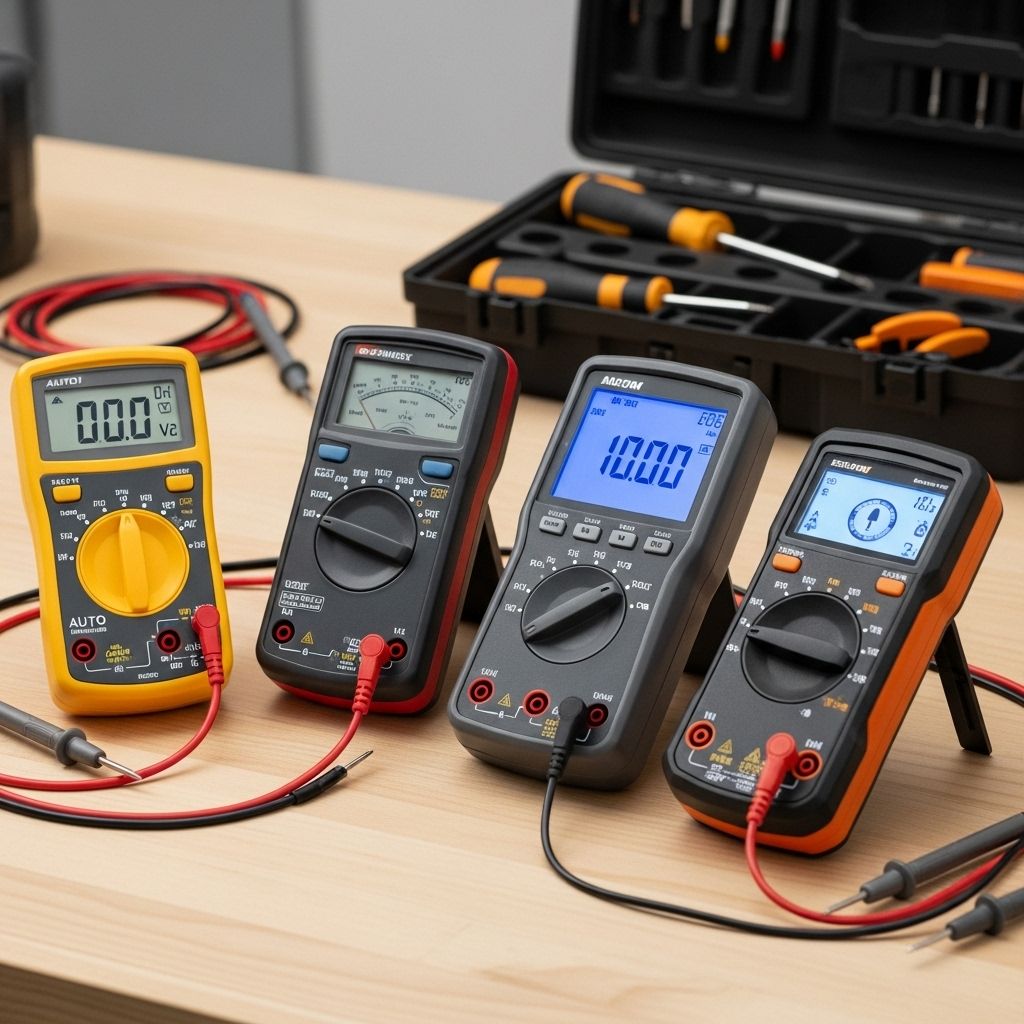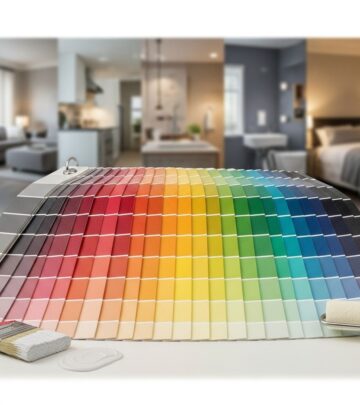Best Multimeter For Home Use In 2025: 4 Essential Picks
Find the perfect multimeter to troubleshoot electrical issues and tackle home DIY projects with confidence

Image: HearthJunction Design Team
Whether you’re a seasoned DIYer or just getting started with home maintenance, a quality multimeter is an essential tool in your arsenal. These versatile devices help you diagnose electrical issues, test batteries, check outlets, and troubleshoot a wide range of household problems. We’ve researched and tested the best multimeters on the market to help you find the perfect match for your home projects.
What Is a Multimeter?
A multimeter, as the name suggests, is a multi-functional measuring device that combines several electrical testing capabilities into one convenient tool. At its core, a multimeter can measure voltage (volts), current (amps), and resistance (ohms), but many modern models offer additional features like continuity testing, capacitance measurement, and temperature readings.
These versatile instruments are indispensable for anyone doing electrical work around the house, from simple tasks like checking if a battery is still good to more complex troubleshooting of appliances or electrical systems. With the right multimeter in your toolbox, you can save time, money, and potentially dangerous situations by identifying electrical problems before they become serious hazards.
Types of Multimeters
When shopping for a multimeter, you’ll encounter two main types: analog and digital. Each has its strengths and ideal use cases.
Digital Multimeters (DMM)
Digital multimeters are the most common type found in homes today. They feature a numeric display that shows precise readings, making them more accurate and easier to read than their analog counterparts. Digital multimeters typically offer more measurement functions and often include additional features like data hold, auto-ranging, and backlit displays.
For most homeowners and DIYers, a digital multimeter is the preferred choice due to its ease of use and versatility. They’re generally more durable, safer for high-voltage applications, and provide clearer readings with less room for interpretation error.
Analog Multimeters
Analog multimeters use a moving needle to display readings on a printed scale. While they’ve largely been replaced by digital versions for home use, they do have some advantages in certain situations. Analog meters are excellent for observing trending values or fluctuating readings, as the movement of the needle is continuous rather than the discrete updates of a digital display.
However, analog multimeters are typically less accurate than digital models and require more skill to read correctly. They’re also generally less durable and offer fewer measurement functions. For most homeowners, a digital multimeter will be the more practical choice.
Key Features to Consider
When selecting the best multimeter for your home projects, several important features will determine which model is right for your needs:
Safety Ratings
Perhaps the most crucial consideration when choosing a multimeter is its safety rating. Look for multimeters that feature CAT (Category) ratings that match your intended use. CAT III and CAT IV ratings are best for most homes and ensure the meter can safely handle potential voltage spikes without putting you at risk.
Measurement Capabilities
While all multimeters can measure voltage, current, and resistance, more advanced models offer additional testing capabilities that might be useful depending on your projects:
- Continuity testing: Checks if a circuit is complete with an audible beep
- Diode testing: Verifies semiconductor components
- Capacitance: Measures the energy storage capacity of capacitors
- Frequency: Measures electrical signal cycles
- Temperature: Some models include temperature probes
Auto-Ranging vs. Manual Ranging
Auto-ranging multimeters automatically select the appropriate measurement range, making them more user-friendly for beginners. Manual ranging models require you to select the measurement range yourself, which can be more time-consuming but offers greater control and precision for experienced users.
Durability and Build Quality
A good multimeter should be built to withstand the occasional drop or bump. Look for models with rubber holsters or impact-resistant cases, especially if you’ll be using it in challenging environments like attics, basements, or outdoors.
Display Quality
A clear, easy-to-read display is essential for accurate readings. Many premium models feature backlit displays for working in poorly lit areas. Some also offer larger digits or high-contrast screens for better visibility.
Top Picks for Home Use
After extensive research and testing, we’ve identified the best multimeters for various home applications and user experience levels.
Best Overall: Fluke 107 Digital Multimeter
The Fluke 107 consistently stands out as the best overall multimeter for homeowners. Fluke has established itself as the gold standard in the industry, known for reliability, accuracy, and safety. The 107 model offers an excellent balance of features, ease of use, and durability that makes it perfect for both beginners and experienced DIYers.
With auto-ranging capability, CAT III safety rating, and a clear digital display, the Fluke 107 handles most household electrical testing tasks with ease. It measures voltage, current, resistance, continuity, and more, providing all the functionality most homeowners will need. While it comes at a higher price point than some competitors, the quality and reliability justify the investment for those who value safety and accuracy.
Best Value: Greenlee DM-20
For homeowners seeking a balance of quality and affordability, the Greenlee DM-20 offers excellent value. This digital multimeter provides all the essential functions needed for home electrical projects without breaking the bank. It features a user-friendly interface with clear markings and a large, easy-to-read display.
The Greenlee DM-20 includes voltage, current, and resistance measurements, plus continuity testing and a built-in non-contact voltage detector for quick safety checks. Its compact size makes it easy to store and carry, while its durable construction ensures it will last through years of home projects.
Best Budget Option: AstroAI Digital Multimeter
If you’re just getting started with DIY electrical work or need a basic multimeter for occasional use, the AstroAI Digital Multimeter offers impressive functionality at an entry-level price. Despite its affordable cost, this multimeter doesn’t compromise on essential features or safety.
The AstroAI includes auto-ranging capability, which is rare in budget models, making it more user-friendly for beginners. It can measure AC/DC voltage, current, resistance, continuity, and even temperature. A protective rubber sleeve helps protect it from drops and damage, while the large LCD display ensures readings are easy to interpret.
Best Professional Grade: Fluke 87-V Digital Multimeter
For serious DIYers or homeowners with complex electrical systems, the Fluke 87-V represents the pinnacle of multimeter technology. This professional-grade instrument offers exceptional accuracy, reliability, and a comprehensive range of measurement capabilities that go beyond what most home users need—but for those who want the best, it’s worth the investment.
The Fluke 87-V features true RMS measurements for accurate readings on non-linear signals, temperature measurement, frequency counting, and a high-resolution display with a built-in backlight. It’s rated for CAT III and CAT IV environments, making it one of the safest options available. While its price tag puts it in the premium category, its durability means it will likely be the last multimeter you’ll ever need to buy.
How to Use a Multimeter
Even the best multimeter is only useful if you know how to operate it safely and effectively. Here’s a brief guide to get you started with basic multimeter functions:
Measuring Voltage
To measure voltage (the electrical potential difference between two points):
- Set the multimeter dial to AC voltage (V~) for household outlets or DC voltage (V⎓) for batteries and most electronics.
- Insert the black probe into the COM port and the red probe into the VΩmA port.
- Touch the probes to the points you want to measure (red to positive, black to negative for DC).
- Read the measurement on the display.
Always start with the highest range setting if using a manual-ranging meter, then work down for more precision.
Testing Continuity
Continuity testing checks if a circuit is complete or broken:
- Turn off power to the circuit you’re testing.
- Set the multimeter to the continuity mode (usually marked with a sound wave symbol).
- Touch the probes to the ends of the wire or component you’re testing.
- If you hear a beep, the circuit has continuity; no beep means the circuit is broken.
Measuring Resistance
To measure resistance (the opposition to current flow):
- Ensure the circuit is powered off.
- Set the multimeter to the resistance (Ω) function.
- Connect the probes across the component you want to test.
- Read the resistance value on the display.
Safety Considerations
Working with electricity always carries risks, so proper safety precautions are essential when using a multimeter:
- Always inspect your multimeter and test leads for damage before use.
- Use the appropriate CAT-rated multimeter for your application.
- Keep your hands behind the probe barriers when testing.
- Disconnect power when possible before testing components.
- Use only one hand when possible to avoid creating a path for current through your heart.
- Never use a multimeter in wet conditions or with wet hands.
- Always start with the highest range setting when measuring unknown values.
Frequently Asked Questions (FAQs)
Q: Which multimeter is best for beginners?
A: The Fluke 107 digital multimeter is widely considered the best option for beginners. It’s easy to use, offers auto-ranging capability, and provides most functions a DIYer will need while maintaining high safety standards.
Q: What type of multimeter is best for home use?
A: A standard digital multimeter is typically best for home use. Models like the Greenlee DM-20 check almost all the boxes for household electrical testing while offering good value and user-friendly features.
Q: Is an analog or digital multimeter more accurate?
A: Digital multimeters are generally much more accurate than analog models, primarily because they’re easier to read with precise numeric displays. With minimal price difference between basic models of each type, a digital meter is almost always the better choice for home use.
Q: How much should I spend on a multimeter for home use?
A: For basic home use, you can find a reliable digital multimeter in the $30-$60 range. If you plan to do more complex electrical work or want professional-grade features, investing $100-$200 in a higher-quality model from brands like Fluke or Klein Tools can be worthwhile.
Q: Can I use a multimeter to test if an outlet is working?
A: Yes, you can use a multimeter to test if an outlet is working by setting it to AC voltage mode (typically 200V range) and carefully inserting the probes into the outlet slots. However, for regular outlet testing, a dedicated outlet tester is safer and more convenient.
Q: How often should I calibrate my multimeter?
A: For typical home use, most quality multimeters don’t require regular calibration. However, if you use your meter frequently or for precision work, having it professionally calibrated every 1-2 years is recommended. Many manufacturers also recommend replacing the batteries annually for optimal performance.
The Bottom Line
A quality multimeter is an investment in your home maintenance toolkit that will pay dividends in troubleshooting ability and repair savings. For most homeowners, a mid-range digital multimeter with auto-ranging capability and basic measurement functions will handle the vast majority of household electrical testing needs.
When choosing the best multimeter for your home, consider your skill level, typical projects, and budget. Prioritize safety features like proper CAT ratings and quality test leads, even if it means spending a bit more. With the right multimeter in hand, you’ll be well-equipped to tackle electrical problems around your home with confidence and safety.
References
- https://www.thisoldhouse.com/electrical/101385/all-about-multimeters
- https://www.bobvila.com/articles/best-multimeter/
- https://www.youtube.com/watch?v=g0YRkwv40r8
- https://www.finehomebuilding.com/project-guides/wiring/the-indispensable-digital-multimeter
- https://www.smartgridmarketplace.com/theblog/easyoverviewofthemultimeter
Read full bio of Shinta










